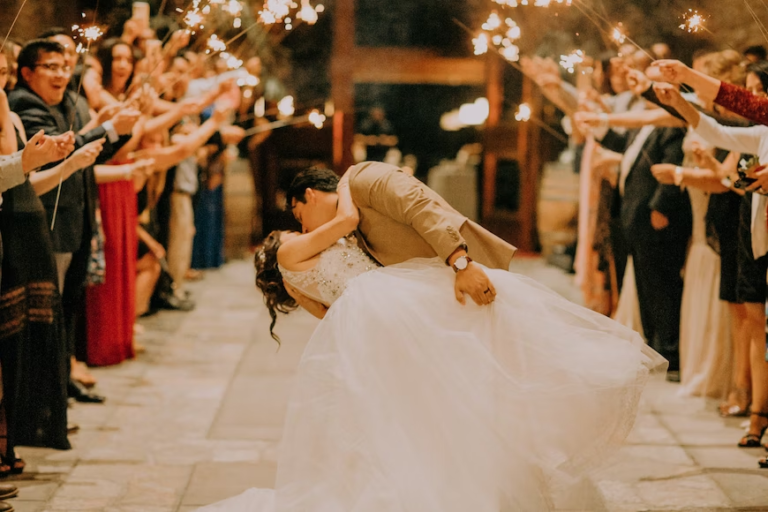There’s nothing in the world quite like a wedding. For a couple, it represents a firm foundation and commitment to a life of love — and for guests, weddings can forge incredible memories that’ll last a lifetime.
Who wouldn’t want to be the wedding planner responsible for making it all come together?
Wedding planners are a special breed of event planner, and there are many different ways to crack the industry and become one.
Here at Eventbrite, we’ve spent the last 15 years connecting wedding planners and giving them the tools to develop their careers and plan incredible events. So we know a thing or two about cracking the industry.
In this guide, we’ll walk you through the benefits of a career as a wedding planner, the skills and qualifications you need to become a wedding planner, and our expert tips on how to set up your own wedding planning business.
Let’s start with the important part.

Why become a wedding planner?
Before we speed right into the skills and qualifications you might need to develop to become a wedding planner, let’s pump the brakes for a minute and talk about why it’s such a rewarding (and high-demand) career.
Whether you’re a seasoned event planner keen to try out wedding planning or an aspiring event creator wondering how to crack the industry, wedding planning is unlike any job you’ve ever done.
Firstly, embarking on becoming a wedding planner offers an empowering journey, as it brings immense validation to your work. A wedding planner gets to manage the most important day in a couple’s life. People will remember the events you create for a lifetime and pass down those memories through generations.
What could be more rewarding than that?
Well, wedding planning is also a great career choice because it provides steady work and plenty of prospects.
According to The Knot’s 2022 Real Weddings Study, 29% of all couples hire a wedding planner to coordinate their special day — no matter how the economy is performing, people will always get married.
Also, once you’re an established wedding planner, you’ll have control over your income and time. You can choose the weddings you take on and your client rates. From there, you’re free to exercise your creativity and skills to create a steady supply of once-in-a-lifetime events.
Finally, working in events not only lets you create and curate unique experiences but allows you to forge connections and give back to a wide range of communities.
Want to ensure you have the right tools to get started in the events business? Join Eventbrite free to discover what it takes to create and manage events.

What skills do you need to become a wedding planner?
Anybody can become a wedding planner. But if you want to be truly successful in the wedding industry, there are a few core skills you’ll need to have (or be willing to develop).
To give you an idea, let’s break down the essential skill set you’ll need to conquer the wedding game.
Communication skills
To be an event planner, you must have stellar communication skills — but communication skills are even more critical if you’re a wedding planner.
But wedding planning isn’t just about listening. You’ve got to be able to get discussions going with your clients so that you can deliver their dream wedding down to the tiniest detail. You’ve also got to be able to set up clear lines of communication and be transparent and open with your clients to manage expectations.
In addition to communicating with the couple, you must always be on hand to work alongside vendors, wedding venue managers, celebrants, caterers, drivers, musicians, and everyone in between.
Organization skills
You’ll need impeccable organization and time management skills to make it as a professional wedding planner. For many couples, a wedding is a once-in-a-lifetime event, meaning they will want their day to be perfect.
That’s where you come in.
Wedding planners need to stay on top of numerous areas before, during, and after a wedding. We’re talking everything from booking a celebrant and negotiating with caterers to seating arrangements, invites, vendor management, and settling invoices after the reception.
Need help staying organized? Eventbrite is the perfect place to start. Our platform seamlessly integrates with loads of productivity, email, and CRM apps enabling you to bring all your tools into one place to manage every element of your events using one sleek dashboard.
Research skills
If you’re lucky, clients will give you a detailed wish list for their wedding day. But wedding planners will often take on couples without a clue about what kind of wedding they’d like.
It’s your job to give them ideas. As a wedding planner, you need to be able to turn a bride or groom’s vague mood board into a detailed shortlist of venue, catering, music, and cake options. That means deploying brilliant research skills to sniff out vendors that are a perfect match for somebody’s perfect day.
Not sure where to start? Eventbrite can help. By joining Eventbrite, you’ll gain access to our Preferred Onsite Vendor Network. You’ll be able to find and book videographers, staff, photographers, and more.
Budgeting skills
According to The Knot’s 2022 Real Weddings Study, the average US wedding came in at $30,000. That sounds like a lot — but once you’ve started paying caterers, booking dates, and hiring vendors, that budget will melt away quickly.
That’s why wedding planners need to be intelligent budgeters. You need to understand what your clients’ budget is right off the bat and plan accordingly. You can’t afford any nasty surprises, and many couples aren’t in a position to run over budget.
At the end of the day, your budgeting skills have got to protect the couple of the hour from epic disappointment (and possibly financial ruin).
Want to learn more about budgeting for the perfect event? We’ve got you covered.
Negotiation skills
In addition to budgeting skills, great wedding planners must be decent negotiators.
You can help couples spread their money further by making compromises and striking deals.
You need to be comfortable asking venues and vendors for extra perks, bulk deals, package alterations, early access, and a million other things. That takes solid people skills and courage — but those who don’t ask don’t get.
You are your couple’s white knight. You need to be able to ride into any conversation, take the reins and try to make the best of every situation.
Ability to work well under pressure
Let’s face it: Weddings can be stressful. There are a lot of details that brides and grooms expect to fall neatly into place — and when things don’t go to plan, some clients don’t take it well.
As a wedding planner, you’ll often be the messenger running back and forth between anxious wedding couples and irate vendors. You often need to be able to brush off criticism in the heat of the moment and perform quick negotiations and bookings at the drop of a hat.
If you’re able to perform well under that kind of pressure, you’re well-poised to kickstart a new career in planning nuptials.

What qualifications do you need to become a wedding planner?
Technically, you don’t need a degree or a qualification to become a wedding planner.
That being said, various qualifications and certifications can help you develop the knowledge and skills you need to succeed. To help give you an idea, we’ll break down some of the most popular certification routes aspiring wedding planners pursue.
Get a college degree
One pathway to becoming a wedding planner is to get a college degree. Many colleges and universities across the country (and the world) offer degree programs covering relevant areas.
You might be keen on a four-year bachelor’s degree. The most common bachelor’s degrees in the wedding event space are event management or hospitality management.
The benefit of taking a college course in event management is that you will have more time to gain a firm foundational knowledge in event management. Many bachelor’s college courses also feature hands-on work experience or unpaid internships — a brilliant way to dip your toe in the water and test out your new skills in a controlled environment.
If you’ve already earned a degree in something else and are looking for a career change, you might be keen to do a master’s degree in event management instead. These courses are shorter (usually two years) and more intensive, but you’ll graduate ready to hit the ground running.
We know that college isn’t for everyone. Fortunately, there are other ways to get formal training as a wedding planner — and one of the best is to get an industry certification.
Get certified by an industry body or trade organization
If you’re not interested in devoting the time (or tuition money) to a college degree, several industry bodies and trade organizations offer short certification courses designed specifically for wedding planners.
Examples include the American Association of Certified Wedding Planners, the Certified Wedding and Event Planning course from the Wedding Planning Institute, and the Certificate in Wedding Planning from The Wedding Academy, to name a few.
The benefit of these certifications is that many are hyperfocused on wedding planning — whereas many college courses will offer a broader education that includes all kinds of event planning. But if you’re only interested in planning nuptials, this might be more direct and affordable.
Want to explore different ways of learning? Take a look at the huge range of online wedding planning courses and certifications in our community.
Now that we’ve covered the qualifications you can pursue, let’s talk about how to gain work experience as a wedding planner.

How to gain experience as a wedding planner
Regardless of whether you’ve opted to get some degree or trade certification, you’ll also need to gain work experience before you can kick-start your own business.
There are a few different ways to get your foot in the door. Let’s look at some of the most common ways to secure experience as a wedding planner.
Find an internship or entry-level position
One way to get work experience is to take on an internship with an existing wedding planning business.
More established wedding planners or event companies might advertise internship opportunities — but you shouldn’t be afraid to approach companies directly. Send them your resume, tell them what kind of experience you want, and let them know you’re available to help.
You’ll be surprised how many companies will be receptive and even happy to take you in for a few weeks (or months) to lend them a hand planning weddings and executing event plans.
Not sure how to get in touch with event creators? Check out the Eventbrite Community for inspiration. If you see a creator you’d love to work for, head to their page and follow them or send them a DM. We’re always happy to connect creators and get some collaboration going.
If you’d like to work right under a mentor and learn the wedding business in and out, another option is to become a wedding planner’s assistant.
Become an assistant wedding planner
We’ve already mentioned that pulling off the perfect wedding takes a lot of organization. That’s why even the best wedding planners may require support from assistants — and these roles offer the ideal training ground for you to find out what it takes to create your own wedding planning business.
It’s worth checking out job classifieds and industry websites to see if any assistant wedding planner jobs are listed near you. But again, sometimes it’s best to take some initiative and approach wedding planners about the possibility of becoming their assistant.
You could land your first job in the wedding industry by plucking up some courage and making a call.
Volunteer at wedding events
Another great way to learn the ropes and hone your skills is to start attending and volunteering at wedding events. Wedding events are the perfect places to network with other professionals, learn tricks of the trade, and get job and client leads.
Looking for events near you? Eventbrite curates lists spanning a range of in-person and online wedding events with which you can get involved. Take a look to find out how you can get started.

How to create a wedding planning business
After you’ve secured some work experience and are ready for the big show, it’s time to start setting up your wedding planning business.
No two businesses are alike. But you should consider a few key considerations to ensure you’ve got all your bases covered.
Develop a business plan
Even if you’re going into business as a self-employed contractor, you should develop a business plan.
A wedding planning business plan is a living document that spells out what your company does, how operations are managed, and the tools you utilize to carry out those operations. Business plans are a living, breathing document that you should review and update annually to ensure you’re working towards your goals and taking the proper steps to hit your key performance indicators.
If you’ve never done a business plan, we’ve created this guide to help you get started.
Marketing yourself
If you want to earn clients as a wedding planner, you need to be able to promote yourself and your work. That means building a website, networking at trade events, and creating a pool of testimonials.
Social media is a potent tool for wedding planners — and if you’re on the hunt for a simple way to market yourself to potential clients on social and via email, you can leverage a range of tools.
For example, with Eventbrite’s marketing tools you can manage your social ads on different networks using one simple dashboard. We’ve also got integrations with email marketing apps like Mailchimp to help you show off to potential clients, put yourself out there, invite leads to showcases, and more.
Find the right tools
A builder is nothing without a hammer and nails — so how can you expect to plan an incredible wedding without the right tools?
Couples are counting on you to bring ideas, organization, and communication to the table. Fortunately, you can leverage a range of unique and powerful tools to give those happy couples what they’re seeking in a wedding planner.
For starters, you should leverage the knowledge of thousands of event planners and professional wedding planners by exploring the Eventbrite community.
You can browse a range of online and in-person wedding events to network, continue your professional development and even create your events to get the ball rolling.
How will you become a wedding planner?
As you’ve seen, there area bunch of ways to become a wedding planner.
Your route will depend on where you’re at in your career, the skills you need to develop, and how quickly you want to jump into the deep end.
But no matter how daunting it may seem at first glance, if you want to take your passion for weddings and turn it into a career, don’t let anyone stop you. It’s a highly rewarding job — and if you’re willing to take some time to learn the ropes and gain some experience, you’ll be in a great position to become a wedding planning legend.
Ready to start your career planning weddings? Join Eventbrite to learn from our community experts, network, and get the tools you need to manage a once-in-a-lifetime event.





